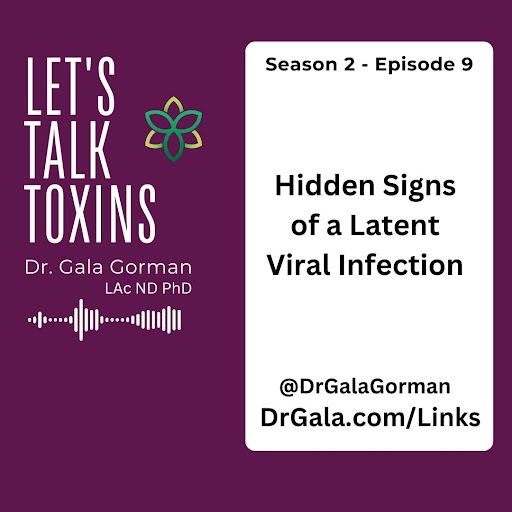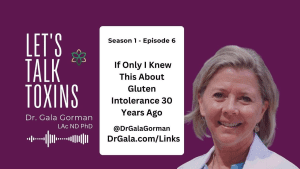NOTE: A machine generated this transcript. Please be aware that it may contain occasional errors in punctuation and spelling.
They think of it as tiny, precise scissors that they go in and modify the DNA. They find specific parts of a virus’s genetic material and cut them out. This helps stopping the virus from causing harm and replicating essentially. So, when they target and eliminate the viral DNA, it helps manage the infections and makes them much easier to treat than what we’re experiencing with some of the current methods.
Welcome to the Let’s Talk Toxin Show. In this episode, I’m focusing on something that affects all of us but often goes unnoticed: the long-term effects of viral infections and the hidden dangers of viral latency. Viruses like herpes and the lingering presence of long COVID are unwelcome invaders in our bodies, causing unexpected symptoms and health challenges.
If you are concerned about differentiating between viral and bacterial infections, understanding the impact of viral toxins on women’s health, or managing the aftermath of viral infections, you’re not alone. I’ll share practical insights and strategies for navigating these complex health issues and supporting your body through the challenges of viral infections. And make sure you stay to the end where I answer questions from women just like you.
And if you’re new here, I’m Dr. Gala Gorman, a licensed acupuncturist, naturopath, and author of “What’s Your Kryptonite?” I wrote the book to help women understand the effects of chronic stress that’s turned toxic. In the book, I share the MOLT Method™ I developed to make it easy to shed stress along with accumulated toxicity. Just like any other creature in nature that’s outgrown its trappings.
Many women find their way to me after trying everything to deal with their annoying symptoms. You may feel like you’ve learned more than you ever wanted to know about health and still aren’t healthy. It is time for a different approach. Symptoms are directly related to stress, but stress isn’t easy to master and it isn’t going away.
If you are ready for a new approach that will lead to stress mastery, I highly recommend my Wellness Warriors membership. It is perfect for those who have a strong sense they’re missing something important—that’s the key to optimal wellness. In the membership, we apply the MOLT Method™ I developed. MOLT is an acronym: M for mindset, O for order, L for lifestyle, and T for toxins. It’s designed to help you shed stress, cruise through midlife symptom-free, and end issues like chronic fatigue, insomnia, and even weight gain. So join us and turn your knowledge into real change. You can learn more at DrGala.com/Links.
In this segment, I share information from research studies related to toxicity. You can think of it as a toxin trend. The T in MOLT , as I mentioned a moment ago, stands for toxins, and I can say with confidence that every symptom is caused by accumulated toxicity.
I evaluate 12 categories of toxicity when I’m working with someone to unravel a health mystery. Our world is full of manmade substances that our bodies were not designed to deal with. Coupled with this toxicity is an overwhelming amount of toxic stressors the body was designed to manage—and it’s no wonder women find themselves playing whack-a-mole with symptoms.
So, here’s a report that’s a great example of a toxin trend: it’s a large-scale study that links herpes simplex virus (HSV) infections to an increased risk of dementia, including Alzheimer’s disease. The study was conducted by researchers at the University of Texas Medical Branch and published in the Journal of Alzheimer’s Disease. It highlights the connection between herpes infections and an increased risk of dementia, emphasizing the need for further research into prevention and some treatment strategies.
The study found that individuals with herpes simplex virus infections have up to 2.44 times higher odds of developing dementia compared to those without. Men with HSV-2 were shown to be at significantly higher risk even than women. The research supports the idea that viral infections like, this HSV contribute to neurodegeneration through inflammation in the brain, which may accelerate cognitive decline and dementia progression.
The findings highlight the importance of further research so that we can learn how to target the mechanisms behind this type of virus and the related cognitive decline. It suggests that antiviral treatments or preventative strategies could potentially lower dementia risk. Antiviral drugs, I will say typically cause uncomfortable side effects, so we are focusing on managing latent viruses naturally. So stick around—that’s exactly what we’re going to focus on in this episode.
Chapter 12 in my book “What’s Your Kryptonite?” is dedicated to helping readers manage what I refer to as “Tricky Toxins.” Our bodies are bombarded with toxicity, so we have to learn to manage it. Just comment “tricky toxins,” and we’ll send you a link where you can download the chapter for free. If commenting isn’t convenient, go to DrGala.com/Links and sign up for my Wellness Weekly newsletter—you can respond to any email you receive from me with “tricky toxins,” and we’ll send you a link.
In this next segment, I’m opening the kimono to share how I was challenged to apply my suggestions—I’m walking my talk—and here’s an example. And remember: every suggestion you’ll hear from me has been tested in the trenches. That includes saying no to symptom suppression.
Over the past four decades, I’ve developed processes that work sustainably. Typically, it requires a combination of approaches that I’ve synthesized to address health issues that show up repeatedly for many women.
In this particular case, I’m not sharing a personal experience but I do have extensive experience with this latent virus idea—how it really makes any potential condition worse. So essentially, a latent virus makes any new virus more potent.
So, if you’ve got cold sores, shingles, certainly genital herpes— but all of these are strains, different forms of herpes—they’re essentially are latent viruses that hide out in your spine and are opportunistic. They’re going to come out and cause havoc whenever you are under stress and your immune system is compromised.
They are triggered by and trigger other autoimmune issues. If you’ve got any sort of autoimmune condition that your body is already trying to manage and keep at bay, these triggers are going to be essentially like lighting a fuse on a bomb.
The food sensitivities, in particular, tend to trigger things like this because foods are something our immune system naturally has to deal with. And so those things if we’ve got any sort of sensitivity to any kind of food, that will tend to trigger something. And, I was just explaining this to a patient earlier today: food sensitivities don’t show up like we think of an allergy or an allergic reaction.
A food sensitivity often will takes days to fully express itself, meaning to really create a problem. And so, take dairy for example. You might have a little cheese on a salad day one, don’t really notice anything. You think dairy must not be a problem; that can’t possibly be the issue. And then the next day, maybe you have a little cream soup or something like that and you feel a little yucky, but you think, well yesterday’s cheese didn’t bother me, so that can’t possibly be what’s going on today—it must be something else.
And then by the third day, you have a little bit of dairy in something and you’ve got a full-blown reaction. And your body is showing signs and symptoms in whatever way is common to your unique expression of that. And you don’t put two and two together because it was dribbled out and it wasn’t an immediate reaction. It’s not like somebody with a peanut allergy eating a peanut and they blow up like a balloon.
So, these food sensitivities can be particularly concerning. We’re going to talk more about that as we move through this episode. The virus is most vulnerable when it’s active. We’re going to talk about this too as we move through this episode because this is when you have the best chance to actually eradicate the virus. It has to be out and active in order to really get at it.
You’re going to want to definitely notice when you’ve got signs of stress. And a lot of times what happens is the stress will take your immune system offline so you don’t maybe have an immediate reaction, but then when your body kinda calms down—you’re out of that situation where your body thought a lion was chasing you—now it pops out. And that can be really disheartening and confusing, but it definitely is a sign that it’s related to the stress and how your immune system is being controlled and manipulated by the stress response.
So what do we need? We need a plan of attack for the first signs of an expression, and typically there are little signs for anybody who has this sort of latent virus. They tend to see signs in the hours or maybe even days before leading up to it. So, you need a plan. We’ll talk more about some things you can do during that period where you have a little time to reverse course.
And then I want to really encourage you not to suppress your immune system long-term. If you are taking any sort of medication—over-the-counter medication or even supplements—that’s designed to suppress your immune system, that is a recipe for disaster long-term. So not a great strategy. You need to get to the root cause of the problem.
One of the ways we know we’ve got a latent virus we’re dealing with is when I use specific frequency with my microcurrent to reduce inflammation, and if that frequency combination creates some sort of reaction that is similar to what somebody would experience with one of these latent viruses, then that’s a clear sign that’s what’s going on.
Now let’s talk about this health concern: the long-term effects of viral infections, particularly the impact on women’s health. Understanding the difference between viral and bacterial infections is crucial as these terms are often confused but have distinct implications for our health.
Symptoms related to viral infections—like those caused by herpes or long COVID—can be diverse and often mimic other conditions, which makes them really challenging to diagnose them. Viral latency—where viruses like herpes remain dormant in the body—leaves you feeling like you’re trying to keep a ticking time bomb from exploding.
And while we can’t completely eliminate the risk of viral infections, the good news is that we can take practical steps to manage symptoms and support our body’s natural defense mechanisms.
So, let’s explore what recent research tells us about managing viral infections, differentiating between viral and bacterial symptoms, and maintaining optimal health during midlife and beyond.
First, we’re going to start by differentiating between viral and bacterial infections. So it’s really helpful because we want to use the appropriate treatment; both types of toxicity can present with similar symptoms, so it does make diagnosing and arriving at a treatment plan challenging.
Viral and bacterial infections can cause fever, cough, even fatigue; but bacterial infections often present with more severe symptoms like high fever or maybe localized pain—even more like aches and pains. There are some techniques to diagnose the difference, like measuring CRP levels (C-reactive protein) or using some kind of clinical infection score.
These can help differentiate between viral and bacterial infections; CRP levels are typically higher in bacterial infections. I will tell you that my way of diagnosing bacterial or viral infections is really simple. We wanna look at the color of the mucus that is being produced by your body trying to fight off this infection.
So doctors like me that specialize in using natural remedies will use the quick and easy mucus test to determine what kind of infection your body is dealing with. While this isn’t a hundred percent accurate, it does give us a good idea and, and in some ways, can be more accurate than a formal clinical test.
Unless they suspect strep throat, they tend to do a culture with strep throat. Otherwise, a medical doctor is typically guessing, and that’s why they often prescribe antibiotics because, from their perspective, they just look at it like it can’t hurt and it might help.
I will say that if your mucus is clear, that’s just normal functioning of your body, and you definitely do not wanna inhibit clear mucus because that’s your body expelling pathogens. And that’s actually a good sign, even if it can be annoying. If it turns white, that typically would point to a more viral kind of infection that is not going to benefit from antibiotic use. And then as the mucus moves to yellow or green, even that can point to a bacterial infection.
Again, this isn’t really a hundred percent accurate, and it is important to accurately diagnose your condition so that you know whether you really need antibiotic treatment. You definitely do not wanna use antibiotics. They’re ineffective against viral infections and really end up contributing to antibiotic resistance, and this is becoming an increasingly a problem.
So just know that as long as your mucus has not gone to kind of a deeper yellow or into green, most certainly you do not have an infection that needs antibiotics. And that I think is a fairly safe assumption. Again, unless you’re dealing with some infection that isn’t producing mucus, and then that’s a whole other rabbit hole to go down.
Viral infections can cause a range of symptoms. We’ve already mentioned some of these: fever, cough, fatigue, even skin rashes and respiratory viruses like we experienced in the last few years and influenza or just the flu are common examples. Certain viruses can also cause distinctive symptoms like chickenpox or joint pain that’s often accompanying the Zika virus or shingles.
When you’re really trying to differentiate between bacterial and viral infections, just know that viral infections often have milder symptoms compared to bacterial infections. Viral sore throats, for example, are typically less severe than bacterial strep throat, and that’s why if you go to see your doctor with a really sore throat, they’re going to take a culture to determine for sure that it is bacterial and calling for antibiotic use.
Treatment for viral and bacterial infections definitely should be different. Treatment for viruses often focuses on symptom relief and supportive care. By supportive care, these are things that are gonna boost your immune system. We’re gonna talk more about this in a few moments, but just know that if you’ve got a viral infection, the thing you can do for yourself that will help the most is to boost your immune system—your natural immune system—reduce any sort of optional stressors and rest.
Antiviral medications can be prescribed sometimes, but they really can cause significant side effects. And most viral infections are managed with rest and hydration—drinking lots of high-quality water—and over-the-counter medications even like acetaminophen or other common treatments.
I would caution you if you’re using anything to kind of dry up the mucus that you think twice about that. I get it that the mucus is really annoying, but it is your body’s way of expelling all those pathogens. And if you are drying that up, you are basically forcing your body to store those toxins somewhere, and that will end up causing a problem down the road.
So as we know, antibiotics are the primary treatment for bacterial infections, and you wanna make sure that you’re using the correct antibiotic—and that obviously is not your problem; that’s your doctor’s problem to figure out if that’s the route you need to take—but it’s important to complete the full course to prevent resistance.
This kind of defies logic because we think we don’t wanna be on antibiotics any longer than necessary because we know antibiotics are killing off good and bad in the process. But actually it’s that full cycle that kills the recurring replication. And so if you don’t complete the full cycle, then actually you leave the process midstream. And this is how the remnants essentially survive and learn to adapt—and you become resistant over time.
So it’s really important if you are prescribed antibiotics that you go ahead and finish the full course and then work to do repair after that job is done. In cases of co-infections with bacterial and viral, sometimes they will prescribe antiviral and antibiotic treatments. But really this is going to be a cocktail of a lot of toxicity in your body and should only be done when absolutely necessary and in more severe cases.
So remember: if you take anything from this—antibiotics do not work on viral infections—they are ineffective against viral infections because viruses don’t have cell walls that antibiotics can target. Viruses are surrounded by a protective protein coat and replicate inside host cells. And so antibiotics work by destroying bacterial cell walls or inhibiting bacterial growth.
And since viruses lack these structures, antibiotics can’t affect them. So they’re doing absolutely no good. The only thing you might experience if you actually think antibiotics helped with a viral infection is they may have just helped kill off kind of a co-infection that you had going on or enough days might have gone by that you actually just started feeling better.
Viral infections like the common cold, flu, even COVID-19, are not treated with antibiotics. And when they are, it’s going to create side effects and contribute to antibiotic resistance. So we’re gonna talk about what happens when you treat with the wrong antibiotic in just a bit. But even though antibiotics are ineffective against viral infections, taking them unnecessarily can cause side effects.
And these range from mild to severe and include allergic reactions. Some of the common side effects are nausea, diarrhea, even yeast infections. Some more severe side effects include allergic reactions and even some other co-occurring infections, especially if there’s inappropriate use or maybe you didn’t finish a round of antibiotics and then you had this side effect occur.
One of the side effects I often see with people who come in to see me, particularly women, are some form of UTI after antibiotic use. Antibiotics may be essential for treating bacterial infections, but it often leads to creating a dysbiosis in the gut, and this will spill over essentially into the urinary tract. It makes treatment really difficult and even takes a long time to completely repopulate the gut in a healthy way.
And so it really can create lasting long-term issues, if you take antibiotics that you don’t need. Misusing antibiotics by taking them for viral infections really does promote antibiotic resistance, and this occurs when bacteria develop mechanisms to evade antibiotics, making infections harder to treat.
Antibiotic use pressures bacteria to adapt and become resistant. That’s why it’s so important to go through the full round of antibiotics because you wanna basically kill off all the replicating bacteria so that there’s nothing left essentially that’s trying to adapt. The resistance really spreads among bacteria and even the bacteria you were targeting. If you manage to control that, the essential knowledge base can be transferred to other bacteria and allow them to spread.
Antibiotic resistance really increases the risk of infections that are difficult or impossible to treat with the current antibiotics that we have available. Some of the things that we absolutely have to have antibiotics for are things like a staph infection or flesh-eating bacteria, so you really need to know that antibiotics are going to work when you need them, which makes it really important not to use them unless they’re absolutely called for.
Remember, antibiotics are not effective for treating common colds, which are usually caused by viruses, and these infections typically resolve on their own within two weeks. Most people are impatient. They go to the doctor within a day or two because they just want it over with quickly. And the doctor just to pacify you is going to prescribe you antibiotics and you’re not doing yourself any favors.
You need to allow your body to use its natural immune defenses and to work its way through it and educate itself in the process. This is how we tune up our immune system. And yes, it will be two uncomfortable weeks, but at the end of that two uncomfortable weeks, you will have an immune system that is stronger and more resilient.
Antibiotics—we’ve already talked about antibiotics and their side effects—but sometimes they even cause diarrhea along with the nausea, and they’re not providing any benefits. So why in the world would you be turning to antibiotics if you don’t absolutely need them?
Antibiotics have saved a lot of lives, but they now are really at the risk of not working as well because of this rise in antibiotic resistance ’cause they’ve essentially been overused.
Some of the ways that the resistance is being combated are phage therapy. There’s some CRISPR techniques and some initiatives that use other kinds of gene therapy. This phage therapy uses bacterial phages or viruses that specifically target and kill bacteria. So this is interesting, right? We’re using a virus to kill bacteria.
These treat infections, including those that are resistant to antibiotics ’cause essentially we’re hitting them in a different way, and they’re not able to defend themselves because they haven’t figured this out yet. This precision approach spares beneficial bacteria and some human cells that would normally be destroyed in the process of antibiotic use. So it really is a promising alternative to traditional antibiotics.
The CRISPR technology is really cutting-edge gene editing and it precisely removes the antibiotic-resistant genes from the bacteria essentially disarming them. So this innovative method offers hope for treating drug-resistant infections by targeting the root cause of resistance.
I would say that if we were not over-prescribing antibiotics, we wouldn’t have as much risk of them being resistant. But I’ve already gone on about that and you know my feeling there. So responsible antibiotic use involves prescribing antibiotics only when necessary, using the correct dose and finishing out your full cycle, and then avoiding misuse for all the reasons that I’ve mentioned here.
Programs like antimicrobial stewardship educate healthcare providers—which is direly needed—along with patients also needed ’cause the patient is the one going to the doctor and saying give me something that will shorten this two-week period of time. And so the doctor has to be educated and willing to take a few minutes and educate their patient that if you take something to arrest that process it’s going to actually make matters worse in the long run.
So we wanna really have healthcare providers and patients educated on the best practices so that we make sure antibiotics remain effective because we definitely have times and places where we need antibiotics to work.
Now let’s turn our attention back to the herpes virus—HSV infections—because my community tends to be middle-aged women, mostly in menopause. And HSV infections are not specifically linked to menopause, but they are somewhat tied to hormonal changes. These hormonal changes may affect immune responses, and this tends to cause flare-ups to happen more often.
Studies indicate that menopause doesn’t significantly impact the actual underlying virus activity, but herpes isn’t isolated just to the genital area. It’s skin and mouth and pretty much can affect what I refer to as dermatomes. If you look at this dermatome chart, you will see that there are areas of the body, the whole body, that are related to a certain spinal segment.
And so if you get a breakout in the same area on your body, that is the spinal segment that that virus hides out in, in between flares. And that’s what we target when we use microcurrent or other sorts of treatments. We’re gonna talk a little bit more about that in a moment, but that’s what we target to try to eradicate the virus. We wanna make it where it doesn’t have a home to retreat to.
Menopause does not measurably affect the intrinsic virus activity in any of these areas, but stress can influence the susceptibility for sure. Postmenopausal women experience changes in their vaginal epithelium and microbiome, and this could also indirectly affect susceptibility to infections like these.
Treatment for HSV remains focused on antiviral medications and supportive care, regardless of whether you’re menopausal or not. But I really think that they’re missing the point because if the virus is flaring more often, it’s a sign of internal stress, the toxic variety.
And researchers have found that menopause is associated with a decrease in the body’s natural defenses against any sort of virus really. And this is, I believe, due to the fact that we tend to be under more stress during this period of time as you’re going through menopause because our body is trying to adjust to these hormonal changes.
And many of us go into menopause with adrenal fatigue already. The adrenals are supposed to kind of take over for the natural hormone production. And if you are already experiencing adrenal fatigue, the adrenals have nothing to donate, which means that stress really rises in the body, which then allows any of these things to kind of use the opportunity to wreak havoc.
A decrease in immune function may make postmenopausal women more susceptible to these kinds of infections compared to premenopausal women, but really it boils down to stress hormonal changes are causing. And it doesn’t really affect directly the body’s defenses against any particular virus, but all of these stressors basically are heaping on and it makes your body just less able to handle the toxic load essentially.
When we’re talking about COVID and particularly long COVID, this can really have long-term effects and it may overlap with somebody going through menopause and really having menopausal symptoms. So this complicates diagnosis and even management, particularly for women that are transitioning through this period.
Symptoms include fatigue, brain fog, and as you know if you’ve been through this, these are symptoms that we experience typically when going through perimenopause and into menopause. So it makes sense that it would be really difficult to diagnose what’s actually causing the problem. Is it long COVID? Is it latent virus? Is it just hormonal changes?
So in order to be able to manage these conditions, we’ve got to be able to differentiate between them. Women may experience ovarian dysfunction and related hormone production dysfunction related to the COVID virus. And this can also influence the timing of menopause, and certainly if there’s any sort of manipulation going on there, that can make symptoms more severe.
Long COVID is associated with chronic inflammation, and this also makes menopausal symptoms worse and again, can particularly be problematic for ovarian health.
Remember, you can get the Tricky Toxins chapter of my book, “What’s Your Kryptonite?” for free—just comment “tricky toxins,” and we’ll send you a link where you can download the chapter. If commenting isn’t convenient, go to DrGala.com/Links and sign up for my Wellness Weekly newsletter. You can respond to any email you receive from me with “tricky toxins,” and we’ll send you a link.
Now, let’s continue with a few practical ways to address the long-term effects of viral infections and manage viral latency, particularly with conditions like herpes and long COVID. These viral issues can affect more than just our immediate health—they can have a lasting impact on our overall well-being and increase our risk of various complications during midlife.
Here’s some more good news though: even small changes in our daily routines that result from an understanding about how to differentiate between viral and bacterial infections and being aware of the effects of viral toxins on women’s health can significantly reduce our risk of severe outcomes and support our body’s natural defense mechanisms.
And don’t forget when I’m done—drop a comment to share what you found most interesting about this whole topic of latent viruses.
So, one of the best ways to deal with these latent viruses is by using lifestyle modifications, and these include diet and exercise. And they really help manage viral reactivation by enhancing immune function. Consuming a balanced diet with functional foods like probiotics, omega-3 fatty acids, and polyphenols can enhance immune response and potentially reduce viral reactivation.
Foods rich in vitamins, minerals, and antioxidants like fruits, vegetables, olive oil really support immune health. The benefits of exercise should not be minimized. Regular moderate exercise also boosts immunity and reduces stress—and stress triggers viral reactivation. So it really helps. And not only does it reduce the triggers, but it also improves immune function.
So the keyword here is moderation. You wanna make sure that you’re moderating your exercise because if you are exercising too much or too extreme, it causes additional stress on your body. And if your body is already working overtime to try to manage this latent virus, then it makes sense that over-exercising and putting that additional stress on your body is causing repeated flare-ups.
Functional foods and physical activity really play crucial roles to enhance the immune system and reduce the risk of viral infections. And we know that these infections can really cause a lot of pain and discomfort, lost time, and they come back repeatedly and can really be frustrating. So it’s important to use some lifestyle modification to reduce the triggers so that if you do have a flare-up, that the flare-up is short-lived and doesn’t happen very often.
Understanding triggers like stress or sunlight and taking some preventative measures can help manage these latent viruses and really reduce the risk of complications. It’s really important too, to be aware of the triggers. When you learn what triggers a virus in your body, then that’s really empowering.
And you know sometimes we end up exposing ourselves and allowing a trigger to happen essentially, knowingly, hoping that we don’t have a reaction, that maybe this time our immune system will not have a stress response that will cause a flare-up. But at least if we are aware of the triggers, we know what to manage on an ongoing basis and we can mostly avoid those things.
This is really the most crucial thing that you can do as a form of self-care to effectively manage these latent viruses. So, as I mentioned, stress is the most common trigger, but that stress shows up in so many ways that we often don’t put two and two together.
What we tend to see are things like a fever or maybe even a sunburn from not a whole lot of sunlight exposure even. Even certain vaccines might cause this sort of flare-up. And so some of these triggers really are hard to manage, and that just means that we really have to better manage what we have control over.
And we do that by using techniques like mindfulness and yoga and really doing something like I usually recommend, and that is avoiding things that often cause flare-ups. A lot of people have food sensitivities to what I refer to as the Fierce 5, and that’s dairy, sugar, yeast, gluten, and alcohol. And so it can really help to minimize your exposure to these things.
Go back and re-review if you missed how I explained the way dairy works in the body of anybody who has some sort of sensitivity to it. And you’ll understand that these reactions don’t happen immediately and they can be really tricky to connect the dots with.
There is some evidence now that shows that vaccines can trigger the reactivation, especially of herpes virus. And really, it’s important to let your practitioner know if you have any sort of latent virus that might be triggered by something, because that might affect whether or not this type of vaccine is recommended for you.
It is also common for someone with a latent virus to have a more severe experience with the virus. And so if that is something that has happened for you, then just know that you’re more at risk in the future and you may want to be really mindful about how you manage any sort of vaccination.
Now let’s talk about how to get rid of a latent virus. Isn’t that what everybody wants? Researchers are exploring novel strategies to target these latent viral infections. One promising approach involves CRISPR technology—we kind of talked about that a bit ago. It’s basically gene editing and it specifically targets and eliminates the latent viral genomes.
These studies have been focused on Epstein-Barr and Burkitt’s lymphoma cells, so they really are targeting what would be considered a more extreme kind of condition. But if they can figure it out for something extreme like that, then it will be able to be adapted for some of these other more common conditions.
Researchers at Fred Hutchinson Cancer Center have developed an experimental gene therapy that can significantly reduce or eliminate latent herpes simplex virus infections in animal models. This approach involves using DNA-chewing enzymes to target the virus. So these are really like next-level, leading-edge technologies and methods that they’re exploring.
There’s lot of potential for future human application. Obviously, they’re not going to test this on humans until they’re really convinced that there’s not gonna be any severe reaction or side effects worse than the latent virus itself.
Researchers have been exploring a new way to fight viruses that remain dormant in the body, like we’ve been talking about here—these latent viruses—this is also a CRISPR-related technology. They think of it as tiny, precise scissors that they go in and modify the DNA.
They find specific parts of a virus’s genetic material and cut them out. And this helps stopping the virus from causing harm and replicating essentially. So when they target and eliminate the viral DNA, it helps to manage the infections and makes them much easier to treat than what we’re experiencing with some of the current methods.
So really is showing promise for treating some diseases caused by these latent viruses that hide out in the body.
Researchers at this Hutchinson Cancer Center have also been working on an innovative gene therapy to combat herpes infections, and this uses special viruses that deliver enzymes that cut out the herpes virus from infected cells. This has also shown some promise in reducing viral shedding in mice.
It’s still in the early stages and faces challenges for sure, but it offers hope for future treatment and could significantly reduce or eliminate herpes infections in humans. What I like most is this shock-and-kill strategy. And if you’re using a shock-and-kill strategy in a movie or in politics, I’m definitely not interested—but a shock-and-kill strategy with these latent viruses? I’m all over that!
So the shock-and-kill strategy approach involves using drugs to reactivate the latent virus. Remember I told you that the virus was most susceptible whenever it is out and active. So they use the drug to reactivate the latent virus, and then it’s susceptible to attack by the immune system or even antiviral medications. We don’t use medication, but it’s a similar sort of process.
That’s primarily being researched for HIV, but it could be applied to other latent infections as well. The strategy aims to reduce the reservoir of latent viruses in the body, so this is very similar to the method that I suggest, which is using microcurrent to boost the immune system. And so we want the virus to be active and then essentially we are going to zap it with the microcurrent, and this tends to work really well at getting it eradicated over time.
Researchers have been exploring ways to manage these latent viruses by focusing on lifestyle changes and boosting the immune system as well. So they’re gonna be on board telling you to eat a balanced diet, exercise regularly, and manage stress, and agree that this is gonna really help to reduce the risk of viral reactivation.
The answers I give to questions I receive quite often apply to and would be helpful for most women. I’ve accumulated a few related questions and I’ll answer them in this segment. I call it “Ask Away.” If you’d like to ask a question, I created a form so that it’s sure to get answered, and your question could be shared in a future episode helping many other women.
So comment “question,” and we’ll get you a link to the form. If commenting is inconvenient, go to DrGala.com/Links and sign up for my Wellness Weekly newsletter. You can respond to any email you receive from me with “question,” and we’ll send you a link.
Can viral toxins affect my hormonal balance during menopause?
Well, viral infections can indirectly affect hormonal balance by causing inflammation and stress, and this can make menopausal symptoms worse. But really, viral infections do not have a direct effect on hormone levels. And there is some research around this, but there has not been anything conclusive.
Estrogen—one of the hormones that is most critical to balance with females—does play a role in immune function, and changes in estrogen levels during menopause can affect the immune response to viral infections. So that is one way that it might seem like hormonal changes and viral infections are related.
Chronic stress, on the other hand from viral infections definitely does disrupt hormonal balance, but honestly, any stress will disrupt hormonal balance, especially as we go through menopause because our body is relying on the adrenals to pick up the slack as our hormone load essentially changes.
And most of us go into menopause with adrenal fatigue, which means that our adrenals are not fully functioning either, and this allows stress to escalate and all sorts of side effects are the result. So we tend to have worse menopause symptoms. Those include mood swings, hot flashes, along with anything else that’s commonly associated with menopause.
What are some common viral infections that impact women over 50?
Well, first, I would say that if a woman over 50 gets the flu, this can escalate to RSV—a respiratory virus—and this is quite common in older adults. It can lead to really severe respiratory issues. HSV or the herpes simplex virus is also common, but even more common for older people is VZV—which is the shingles virus. This can be really problematic for older women with a weakened immune response.
Older adults are also at higher risk for having severe COVID-19 symptoms, and it’s thought that this is due to age-related immune decline. But I believe that a lot of people have latent viruses that their body’s already trying to manage. If they don’t have a latent virus, then often it’ll be just a toxic load that has accumulated over time. When you’re older, you tend to have more accumulated toxicity.
Are there natural remedies that can help boost my immune system to protect against viral infections?
Most importantly, we use herbal supplements. So these are herbs like garlic, lemon balm, astragalus—these all have antiviral properties and help to boost immune function. We also recommend vitamin C and zinc—these are nutrients (vitamins and minerals) that are essential for immune health—they really help to combat viral infections.
And then there’s probiotics—these also really help because you want to maintain a healthy gut microbiome. This is going to go a long way to making your body more resilient in dealing with viruses and bacteria it comes into contact with.
A quick reminder: we don’t wanna take supplements long term. And the reason I don’t recommend taking supplements long term is that essentially you are creating weak internal systems when you do that because your body basically has now relied on these things from external sources.
So when you need to maybe boost the levels and you would normally take a little bit to boost your own natural levels of something—you really can’t do that because your body has already become accustomed to not having to produce it on its own.
It really does affect long-term your body’s resilience and the strength of the internal systems. And so I definitely use supplements but I don’t use them long term—I use them therapeutically—and I have other videos on my channel that talk about supplements that might be used longer term but why? I go into more detail about why I don’t recommend using supplements long-term.
Can viral infections affect my mental health or mood during menopause?
Viral infections can increase stress and anxiety—that goes without saying—and this obviously can worsen mood swings and even create depression during menopause. Chronic inflammation from viral infections can affect brain health, and this can lead to mood disturbances and even contributes to dementia and Alzheimer’s.
So these are definitely things to consider and to watch for. It’s really important to deal with these viruses, especially the latent viruses, in a mindful way. Viral infections also disrupt sleep patterns, and this can further impact mental health and mood.
How do I prevent viral infections from coming back?
For starters, you wanna strengthen your immune system. That usually involves eating a balanced diet with fruits and vegetables and healthy fats. You may need to supplement with vitamins and minerals if your diet is not rich in nutrients, and those tend to be vitamin C, vitamin D, and zinc.
Again, I don’t recommend using vitamins long-term, but there are some cases where we’re not eating a nutrient-dense diet, and we need to take some form of high-quality multivitamin or mineral complex.
And I tend to recommend that we rotate those because I wanna get them from different sources. Again, that’s in another video. I go into detail there, and so you can search on my channel for supplements, and you should be able to have that video pop up, which will give you a better idea of why I don’t recommend taking supplements long-term generally, but which ones I consider to be an exception. And then even if we are taking them long-term, how I recommend we rotate them.
You wanna make sure that you are getting enough sleep because sleep really is the way our body does all of its repair and maintenance, including to our immune system. And our immune system is critical to be able to fight off viruses.
We also wanna be practicing good hygiene—just things like washing your hands often for at least 20 seconds. You wanna know that your surfaces that you’re coming into contact with are disinfected regularly. I wouldn’t go overboard here, but you wanna make sure that things are kept generally clean.
This includes washing the linens that you sleep on every night, especially your pillowcases. Those linens really take a lot of abuse from skin that we’re sloughing off and all sorts of bodily fluids essentially. So it can be really helpful to make sure that your linens are kept clean at least once a week.
If you find that you are interested in getting the latest recommended vaccination, then you wanna make sure that whoever is recommending that for you understands that you have a latent virus and are at higher risk because they may need to do things to help your body manage that. And you wanna be very mindful that you’re not putting your body under any additional stress while your body’s trying to accommodate the effects of that new pathogen essentially—which is what vaccinations are.
Like influenza and COVID-19—the hope is that you would reduce the likelihood of contracting the virus or primarily experiencing severe symptoms. That’s to be debated, but there is a lot of evidence on both sides for the effectiveness of vaccination. And if vaccinations work for you, then you just want to be very careful managing the effects on your immune system when that is introduced to your body.
And remember, if you’d like me to answer your specific question, make sure to comment “question,” and we’ll send you a link to the submission form. You’ll wanna subscribe to the channel notifications to get regular updates.
And that’s a wrap for this episode. This has been the Let’s Talk Toxins show. Make sure you subscribe to my channel on YouTube and activate the notifications. You’ll get a reminder when I’m going live next. Until then—be well.













